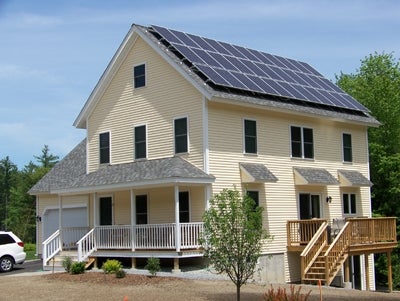R. Carter Scott has been interested in renewable energy for quite a while.
“Back in 1980, I had talked my high school teachers into letting me do papers on solar energy,” he said.
These days, as president of Townsend home construction company Transformations Inc., Scott can sit down with a room full of engineers and architects and make plans for some of the most cutting-edge, energy-efficient homes in the country.
That’s what he did when he set out to design zero-net energy homes that could be built in Devens and serve as an example for the rest of the state. MassDevelopment, the quasi-public entity that oversees development in Devens, chose Transformations from among four developers that applied for the job, giving the company the right to buy eight lots and build moderately priced single-family homes that produce as much energy as they use.
Brain Trust
With the help the Somerville-based Building Science Corp., which offers consulting services on energy-efficient building, and some funds from the U.S. Department of Energy, Transformations convened about a dozen architects and engineers, including some from MIT, and analyzed an earlier Transformations project.
“We put up our zero-energy farmhouse that we had built and said ‘Let’s pick this apart and say how can we do it better?’” Scott said. “Sixteen pages later, we’ve saved 60 percent of the energy.”
Scott and his five-employee company are wired into a whole range of public and private groups that work on environmentally friendly building, including serving on the state’s Zero Net Energy Building Task Force. Frank Gorke, director of the Division of Energy Efficiency at the state Department of Environmental Resources, said Transformations is the only company he can think of that is not just sticking a toe into super-efficient homebuilding but moving forward with whole zero-energy housing developments.
“Doing it well and doing it at scale is a real challenge,” Gorke said. “I guess I would say they’re clearly pointing the way for the rest of us.”
Scott is an engineer himself, with a degree from Northeastern University in Boston, but says most of the work that leads to super-efficient homes doesn’t require advanced scientific knowledge. The keys are about what you would expect: making walls a foot thick rather than the standard 5-and-a-half inches, using more and better insulation and making windows extra tight.
Then there are the photovoltaic arrays that bring in what power the homes do need.
Thanks to the state’s 2-year-old net metering provision, homeowners can sell power back to the grid when they’re not using them at the same price they buy it.
Scott said homebuyers can either lease solar arrays from third parties or buy them and potentially make a profit.
“If someone has the money they can actually make money on their [solar panel] system,” he said.
The surprising thing about net-zero homes may not be so much that they’re possible as that they’re an option for anyone but the most wealthy environmentally minded buyers. Scott said the company made the choice to build a development of zero-energy homes in Townsend at prices comparable to conventional homes on the market.
Last year, he said, despite the rough market, the company sold the first of those homes, complete with a 5-kilowatt solar power system, for $389,000.
The company is now getting permits for developments in Princeton and Harvard, working with another developer on another one in Easthampton and finishing up custom homes in Stow, Maynard and Princeton.

